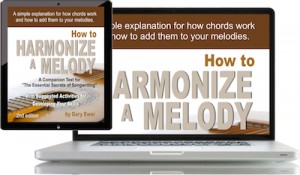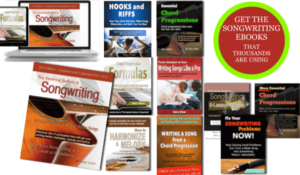It’s helpful to learn how some of the world’s biggest hit songwriters do what they do to create those songs. Barry, Robin and Maurice Gibb (The Bee Gees) wrote some of the world’s biggest pop song hits, for themselves and for others, from the late 60s into the 21st century.
 Do you know how to add chords to that melody you just thought up? “How to Harmonize a Melody” shows you how to do exactly that. It shows the secrets of harmonic rhythm, identifying the key of your melody, chord function, and more. It’s part of “The Essential Secrets of Songwriting” 10-eBook Bundle.
Do you know how to add chords to that melody you just thought up? “How to Harmonize a Melody” shows you how to do exactly that. It shows the secrets of harmonic rhythm, identifying the key of your melody, chord function, and more. It’s part of “The Essential Secrets of Songwriting” 10-eBook Bundle.
In 1987, The Bee Gees released a comeback single, “You Win Again,” which reached No. 1 in several countries. What’s most revealing for songwriters is Maurice’s short description of their process, recounted in Mojo Magazine in a 2001 interview (via Wikipedia):
When we get together and write, it’s not like three individuals ― it’s like one person in the room. Usually, we have a book of titles and we just pick one. I loved ‘You Win Again’ as a title, but we had no idea how it might turn out as a song. It ended up as a big demo in my garage, and I recorded stomps and things. There was just one drum on there. The rest was just sounds. Then, everybody tried to talk us out of the stomps at the start. They didn’t want it. ‘Take it off. Too loud! Can we have them not on the intro, just when the music starts?’ All this stuff, but as soon as you hear that ‘jabba-doomba, jabba-doomba’ on the radio, you know it’s us. It’s a signal. So, that’s one little secret ― give people an automatic identification of who it is.
It’s an interesting and useful bit of information for songwriters, for a variety of reasons, but here are two big takeaways:
Working From a Song Title
Working from a title has a lot going for it. Considering that the hookiest part of your song is likely going to be your chorus, it means that your song title is probably going to feature prominently as a memorable nugget for the audience to remember.
I’ve mentioned before that while clichés are dangerous in song lyrics, they can serve a useful and important function in the creation of song titles. A look through some prominent Bee Gee hit titles confirms this: “I’ve Gotta Get a Message to You”, “Run to Me”, “Islands in the Stream”, “Love You Inside Out” – these are all cliché expressions that work really well as song titles.
Starting your process with a song title also works well because it provides a point of focus for the entire songwriting process. If your song is called “You Never Know Why,” you’ve either got a response that demands a question, or you’ve got something that serves as the last sentence in some sort of story. Either way, the title points you in a direction, backwards from which you can work to create whatever would lead you to sing that line.
Creating a Notable and Memorable Start
Not every song has an iconic beginning, but for the ones that do, there’s value to immediately identifying your song to the world. For fans of “You Win Again”, the first half-second of hearing the percussion was all they needed to know what song they were hearing, and it’s a generator of excitement.
You get the same effect at the beginning of other songs that have gone on to be the biggest hits in pop music history: “Hard Day’s Night”, “Smoke On the Water”, “Let’s Dance” — even something as simple as the muted strings of the guitar opening of “Rolling in the Deep.”
As you begin your songwriting process, think about the following:
- What you can do to create your own memorable start. This often crosses into the realm of production, but as with “Smoke On the Water”, can be an integral part of the songwriting process itself.
- Creating an enticing title that creates images in the mind of the listener.
 Written by Gary Ewer. Follow Gary on Twitter
Written by Gary Ewer. Follow Gary on Twitter
 Get the 10-eBook Bundle that thousands of songwriters are using to polish their songwriting technique. With sound samples, an index of song examples, and covering every topic you’ll ever need to become a top-notch songwriter.
Get the 10-eBook Bundle that thousands of songwriters are using to polish their songwriting technique. With sound samples, an index of song examples, and covering every topic you’ll ever need to become a top-notch songwriter.










